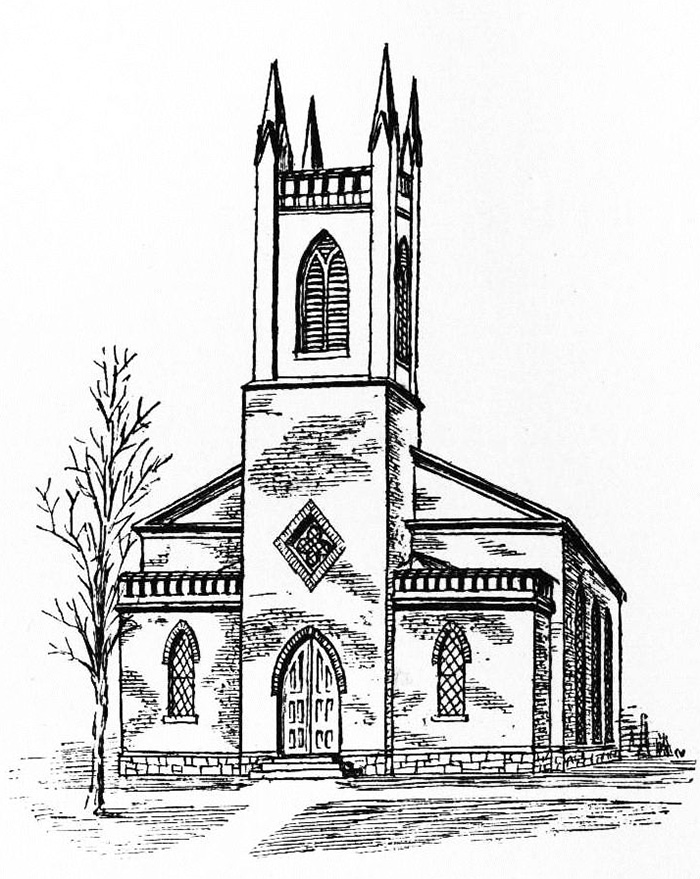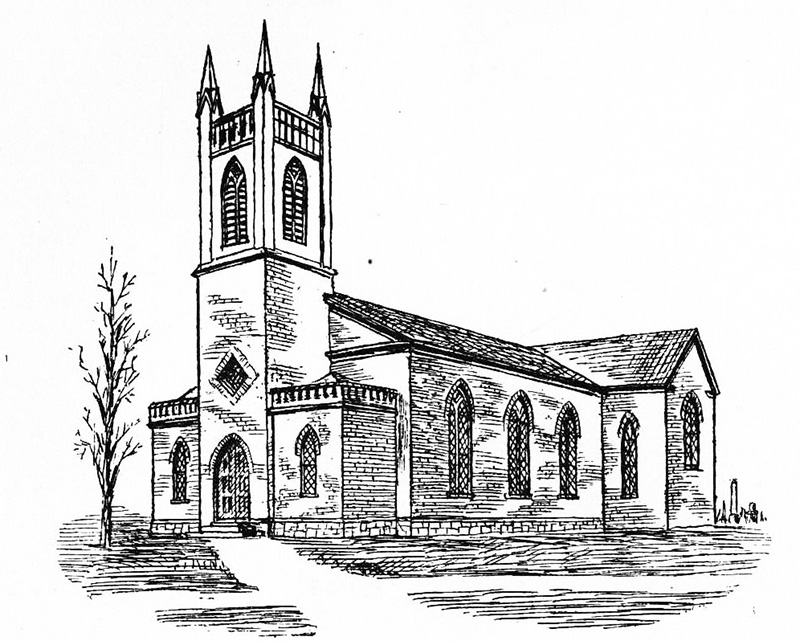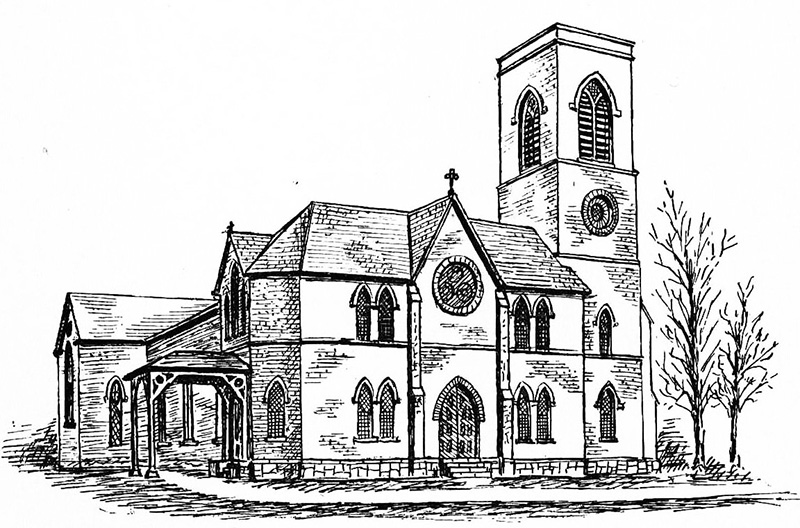
The Church, 1840.

The Church, 1876.

The Church, 1890.
LORD, I HAVE LOVED THE HABITATION OF THY HOUSE AND THE PLACE WHERE THINE HONOR DWELLETH. PSALM XXVI. 8 V.
Well nigh half a century has passed away since this church was consecrated, and it is the third time that I have been asked to come up here and preach a sermon on the occasion of re-opening it after additions and extensive improvements. The cost of the original structure, erected in a day when money went much farther than now, was but a fraction compared with the aggregate of the later expenditures. We all know that fashions change with the demands of- the age, and hence much more is now required than formerly in the way of comfort and convenience to carry on successfully the work of a city or a rural parish. No man builds himself a house to live in without finding when he comes to occupy it where it can be altered and improved. It is somewhat so with churches. "The pattern showed to Moses in the Mount," would not be acceptable to the Jewish mind in these days. If the earliest disciples of our Lord in the poverty of the Christian Church had places of worship religiously [5/6] set apart from every secular use, they must have been simple in their character and devoid of ornament and splendor. Magnificent temples, large and decorated, did not appear until Christians had increased in numbers and in wealth—nor until God was pleased to raise up kings and queens and emperors to be defenders and guardians of the true faith.
This parish in the period of its infancy and feebleness had those connected with it who made sacrifices for Christ worthy of the good name which they bore. They worshipped with their brethren in Wallingford after the cherished Liturgy of their English ancestors until 1760, when they "built themselves a small church" on this site "for their greater convenience in the winter season," and it was opened with suitable religious services and the little flock kept together by lay-reading and a regular parochial organization. Nature has always taught us on the completion of an important structure designed for public and lasting good to solemnize its first appropriation to the purpose for which it was reared by some special recognition, and we have done to-day what your forefathers did when they set up here in love and faith a church as "an ensign on a hill."
In the expansion of towns and villages and the shifting of popular centres, it has frequently been found necessary or advisable to select new locations in re-building houses of public worship, but no such necessity has existed in this place. All the successive [6/7] churches of your parish have risen on the same old historic ground, and you may read the names of their builders engraven upon the stones and monuments so thickly set in the adjoining churchyard. The Barneses and the Beaches, the Bronsons and the Brookses, the Doolittles and the Driggses, the Hitchcocks and the Humistons, the Iveses and the Jarvises, the Mosses, the Potters, the Weltons, and many others that might be mentioned, rest together in "the night of the grave," and from each of them we seem to hear as the lingering voice of a departing echo—"Lord! I have loved the habitation of thy house and the place where thine honor dwelleth."
A fixed resolution to adhere to the worship of God in the sanctuary was a noble characteristic of those who in the olden time hated the company of evil doers and hallowed their lives by keeping ever fresh in remembrance the duty of prayer and praise. When David in another Psalm affirmed, "I was glad when they said unto me: Let us go into the house of the Lord," he spoke the best feelings of our nature and showed how with a full heart he welcomed the privilege of participating in the public ordinances of religion. Who will deny that this is a precious privilege still? Faithfully improved, it will not only lead to a love of the Lord's house but to inward spiritual blessedness. One day in seven is set apart to the purposes of rest and religion, and where or how can some portion of it be better spent than by joining with [7/8] a multitude of Christian worshippers in praying the prayers of the Church and listening to the instructions of her authorized ministers! Churches are not built simply for the adornment of a city or a village. They are imposing objects which no reflecting person can pass by without thinking for a moment of their use and design. The more we frequent them the more we shall prize the worship within their walls. "One great part of the history of the Bible," says Dean Church, "is the history of calls, widely different indeed in their circumstances, but alike in this that they were a claim of Almighty God on the will and choice of man for a free and unconditional service."
This unconditional service we render when we worship Him in the sanctuary in the beauty of holiness, and though we may adore Him elsewhere,—in the family and in the closet, in the forest and in the field, in the valley and on the mountain top, yet His house is called His habitation and the place where His "honor dwelleth." We must remember that the church is very much to us what we choose to make it. We may come to it with a worldly feeling and not reap the benefits which its sacred ordinances were designed to impart. We may take no pains to control and mould our thoughts, and so allow images and recollections to crowd in upon us which are positively destructive of religious enjoyment and profit. The careless, undisciplined worshipper has all kinds of loose ideas carrying off his mind at every moment from the [8/9] proper business of the sanctuary. We are all liable, the best of us, to wanderings in prayer, but if the cares of the world turn our devotions into a sea of tumultuous thoughts, the Spirit moves upon that sea and immediately there comes a blessed calm. Not that we are to have or to expect sensible or miraculous interpositions in the kingdom of grace any more than we expect visible upliftings of the Divine arm on our behalf in the kingdom of providence. We do not live on the calculation of miracles but on the observed and prescribed conditions of the Christian economy. Apart from all answers, whether present or future, prayer both public and private persevered in, must tend to the improvement of individual character. It keeps the soul to its work. If you can each say, "Lord! I have loved the habitation of thy house and the place where thine honor dwelleth," then you have been here at stated times and seasons to manifest your love for it, to pay religious homage to the Most High, to express and strengthen your pious veneration, your thankfulness and your confidence, to seek and receive pure influences from above,—in short to be instructed in the Divine word, and to consecrate yourselves afresh to the honor and glory of God. Habitual prayer builds up the moral life and makes men as members of society different in their whole bearing and character from those who do not pray. It deepens the sense of a personal existence and places the soul face to face with facts of the first order of [9/10] solemnity and importance—with its real self and with its God.
The institution of the Sabbath was a blessed thing for the human race and the command to remember and keep it holy is a perpetual invitation to enter the sanctuary of the Lord and do honor to His great name. It was a wise and merciful ordering of Providence that earthly toil and the rumbling of carts and the hum of busy industries should be suspended every seventh day. God knew that men who bow down their backs always unto the burden and beasts that He has made obedient unto man needed this suspension to rest and regain fresh vigor. Why, a century ago, during the reign of atheistic terror in France, the National Assembly passed an order substituting for the week and the Sabbath the decimal division of time, and making every tenth day a holiday. What was the result? The peasants in the rural districts very soon discovered that the law of God was better for the brute beasts and more profitable than the law of man. "Our cattle," said they, "know the Sabbath and will have it," and before the order was reversed and the nation and its rulers had recovered from their wild delirium, the Sunday—the seventh day—was resumed in many quarters for reasons of economy, and public utility.
If such a thing were possible as striking down all churches in a Christian community and doing away with all remembrance of the Fourth Commandment, it [10/11] is quite certain that that community would suffer morally and religiously, and sooner or later relapse into a condition but little above heathenism. Irreligious persons do not comprehend how much they are indebted to those who love and maintain the habitation of the Lord's house and "in everything by prayer and supplication with thanksgiving make known their requests unto God." They cannot help feeling a sincere sympathy with the success of their work, but they fail to be impressed with the aims of that Divine revelation which lifts us up from earth to heaven. Too many become critics and doubters and shield themselves under the cover of mystery and darkness. They appear to think they are safe in a negative goodness and that what they do not perfectly understand they need not practice. Possession involves responsibility and the word of salvation given to us in order that we may use it for ourselves has enough in it so plain that he who reads it may learn his duty, if he will, and be guided to its habitual practice. How can any one expect to be instructed unless he comes within reach of the instructor? In the man Christ Jesus, the Son of God, there lie the thoughts for all our knowledge and the master principle of all our conceptions. One thing is certain: nothing can take the place of Christianity. There is no substitute which its enemies may propose that will help to remove a shadow that falls upon our paths or lighten a burden that rests on our souls.
[12] When our Lord was upon earth, He bade men follow Him; the spell of his presence drew them and they followed without delay. He is a living Lord and He bids us follow Him now and love the habitation of His house, where He offers His gifts, His word. His sacraments. No change in the phases of modern thought—no teaching that attempts to represent and interpret the spirit of the times is safe teaching if it leaves out of view the essential doctrines and commandments of Christ. We ought to think of miracles in the past—we ought to think of the manifest presence of God in the future as parts of the one great system, of mercy and love which is to be upheld and propagated till we come to "the new heavens and the new earth wherein dwelleth righteousness."
I do not know that I need to extend this line of thought. Enough has been said to show the value of preserving the truth in its integrity and of cherishing a love for "the habitation of the Lord's house." Both individual and social happiness will come from keeping close to duty and following the example of Christ. "The State can make certain kinds of vice unpleasant or unprofitable; it can absolutely forbid certain crimes, and punish them with a terrible vengeance; it can enforce a certain amount of moral training and discipline upon children, and upon the servants in its own employment; but it can do little to make virtue directly pleasant or profitable to the mass of its citizens." [Wordsworth's Bampton Lectures, p. 232.] It is Christianity which does [12/13] this—Christianity which supplies the power of living above the world and of taking an active part in the objects and movements of society without being borne down by evil influences or swayed by evil teachings. Its "ways are ways of pleasantness and all its paths are peace." That thousands and tens of thousands sit beneath the shadow of the true faith and yet are not obedient to it and find no satisfaction in coming to the Lord's house, no one will deny, but this is not the fault of Divine revelation, but rather of depraved human nature which is so blind to spiritual peace and contentment. Even in human nature there is a want which the world cannot supply,—a thirst for objects on which to pour forth more fervent admiration and love than visible things awaken,—a thirst for the unseen, the infinite, the everlasting. There is only one way of satisfying it and that is by going to the well spring of Christ and taking there the water of life offered to every thirsting soul through the grace and mercy of our Heavenly Father.
Every earthly thing is characterized by change and decay. As years come upon us and we live in recollection more than in hope the heart goes back to those places and circumstances which were dear to us in early life. Of the eleven clergymen present at the consecration of this church on the first day of August, 1840, not one is now living except myself, and of the congregation then gathered within these walls, how many sleep the sleep that will know no waking till [13/14] they hear the trumpet-call on the morning of the great Resurrection! So one generation passes away and another succeeds. So one generation does its work for the church and leaves to its successors this precious admonition: "While we have time let us do good unto all men and especially unto them that are of the household of faith."
Probably no one as his steps draw near to the end has other than pleasant recollections of his charities and of the good deeds which God has enabled him to do for his house and people. Men eager for the riches of the world toil night and day to gather them and make investments in institutions which are occasionally wrecked by mismanagement or dishonesty, but nothing given to the Lord is ever really lost or fails to be an element in storing up for the truehearted believer a good foundation against the time to come. A gentleman who had been eminently successful in his accumulations and had never forgotten to honor the Lord with a measure of his substance was by a strange disaster suddenly stripped of his fortune and reduced almost to poverty. A sympathizing friend said to him, "What a calamity! You have lost all." "No;” was the reply, "In my prosperous years I devoted regularly a liberal sum to the Lord. That is saved, that is saved. The rest is gone." By the help of one who was a native of this town, and whose munificent gifts to church and [14/15] educational objects adorn the history of a good life, you have made an addition to this edifice which gives it outwardly a new character and supplies what most parishes in these days feel to be an absolute necessity. [Mr. George A. Jarvis, of Brooklyn, N. Y.] No such noble work is accomplished without anxiety and self-denial on the part of minister and people. Those who come after you will reap the advantage and yet not know what you know. I should have thought that the lines had fallen to me in a very pleasant place, if I had come a Deacon to a church like this instead of coming to the creaking old building which threatened to tumble together every time a gale swept over the village. [The late Rev. Dr. Tillotson Bronson, attending a service when the church was shaken by a violent wind is said to have looked up and around fearfully for a moment and then to have seized his hat and walked hurriedly out. This was done on several occasions.] It does not seem that anything more can be done in the way of material improvements, and now let a new life breathe through the worship of this house and a new love join the hearts of the worshipers. Remember your responsibilities. Remember yourselves. Love this house as the habitation of the Lord and the place where his honor dwelleth. And remember, too, how the apostle Paul winds up the greatest picture of human life and human destiny ever set before the minds of men, thus: "So we being many are one body in Christ, and every one members one of another."